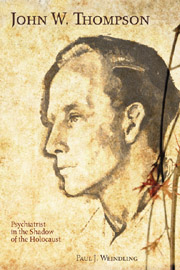Book contents
- Frontmatter
- Contents
- List of Illustrations
- Acknowledgments
- List of Abbreviations
- Part One Into the Dark
- Part Two Redemption
- Part Three Aftermath
- 13 UNESCO: At the Conscience of the World
- 14 The Eau Vive Affair
- 15 Sebastian
- 16 Matthias
- 17 Child Guide
- 18 New York: “St. John the Psychiatrist”
- 19 Hallucinations
- 20 “Dying We Live”
- Appendix John Thompson's Writings
- Notes
- Sources
- Index
18 - New York: “St. John the Psychiatrist”
from Part Three - Aftermath
Published online by Cambridge University Press: 12 September 2012
- Frontmatter
- Contents
- List of Illustrations
- Acknowledgments
- List of Abbreviations
- Part One Into the Dark
- Part Two Redemption
- Part Three Aftermath
- 13 UNESCO: At the Conscience of the World
- 14 The Eau Vive Affair
- 15 Sebastian
- 16 Matthias
- 17 Child Guide
- 18 New York: “St. John the Psychiatrist”
- 19 Hallucinations
- 20 “Dying We Live”
- Appendix John Thompson's Writings
- Notes
- Sources
- Index
Summary
Einstein
Thompson wondered how could he be a doctor in a clinic when the whole world was mad! Milton Rosenbaum sensed Thompson was unhappy in Oxford. “I hired Thompson as a poet” was the disarming explanation of Rosenbaum, the founding professor and chairman of the Department of Psychiatry at the Albert Einstein College of Medicine. “I saw him as a very special person. He had a spiritual side—a philosopher, writer, poet.” Thompson was appointed assistant professor on February 1, 1958.
We find Thompson at an institution whose rationale was to remedy the injustice of discrimination. The Albert Einstein College of Medicine was located in the upper reaches of the borough of the Bronx in New York City. Open to students of all religions, this facility allowed a strong Jewish intake at a time when other medical colleges imposed restrictions. Einstein commended the foundation as of “the greatest importance to American Jewry.” Its ambitious president, Sam Feldman, wanted the medical school to be scientific and secular in ethos, although it was part of Yeshiva University, which was (and is) Orthodox Jewish. The college brought together a brilliant group of professors whose work appealed to bright, irreverent students. Thompson appreciated being part of “the Yeshiva here in New York.”
Joseph Berke, then a medical student, remembered Thompson as “a handsome silver haired Scotsman.” This déraciné appeared otherworldly, ethereal, and mysterious, with a slow, measured speaking voice.
- Type
- Chapter
- Information
- John W. ThompsonPsychiatrist in the Shadow of the Holocaust, pp. 282 - 300Publisher: Boydell & BrewerPrint publication year: 2010



